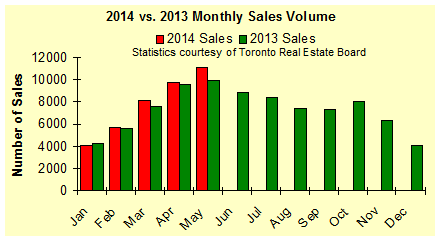Toronto Income Property Newsletter – July 2014
Happy Canada Day. I hope you all enjoy your day off today, and take a moment to reflect on how lucky we are to live in the best city and country in the world. I arrived in Toronto when I was six years old from the UK, and have called Canada my home ever since. Every time I go away to another town, I am happy to arrive back home. I love living in a city where I don’t have to carry a gun, I can enjoy the full spectrum of weather that Mother Nature offers and I can have neighbours and friends of every shape, size and description.
Speaking of our cultural diversity, I hope all of you have been enjoying the World Cup as much as I have. The early buzz is that this has been one of the greatest tournaments ever played. It truly has been fantastic, so try and catch a game or two if you haven’t done so yet.
The Toronto real estate market is slowing up a touch. The number of income properties for sale always decreases in the summer time, so expect it to be a little quieter until after Labour Day. After that there is no reason to believe that the strong sales and heightened demand we saw for the first six months of this year won’t start up again.
-P.A.
Ontario Caps 2015 Rent Increase at 1.6 percent
The government of Ontario has announced that it is capping next year’s allowable rent increases at 1.6 per cent. The cap, also known as the rent increase guideline, is the maximum amount that a landlord can raise a tenant’s rent without the approval of the Landlord and Tenant Board. It applies to rent increases between Jan. 1 and Dec. 31, 2015.
The guideline is based on the Ontario Consumer Price Index, a measure of inflation calculated monthly by Statistics Canada. The 2014 rent increase guideline was just 0.8 per cent — the second-lowest cap since rent regulation was brought in almost 40 years ago. This new increase has doubled the amount by which landlords can raise rents.
The guideline covers about 85 per cent of private residential units in Ontario and applies only to buildings built before November 1991.
Evicting Tenants for Landlord’s Own Use
If you decide that you would like to move into one of your rental units, you are entitled to evict the tenant that is currently occupying that suite at the end of their current lease term. In other words, you can’t ask a tenant to leave until their lease is over. There are no exceptions to this. You also have to give that tenant at least sixty (60) days prior written notice. If the tenant is month-to-month you still have to give the full sixty days notice.
Perhaps the most important thing to remember is that you must use the correct and prescribed forms as is set out in the Residential Tenancies Act. In this case the form is called an N12 – and it must be filled out correctly. The form is available here as a PDF: Form N12
If you do not follow these rules, the tenant can refuse to leave and you may be forced to get an eviction judgment from the Ontario Rental Tribunal – which has been created for the express purpose of mediating landlord/tenant disputes.
If you are not sure how to proper to fill out this form, please contact your lawyer or give us a call and we will happily guide you through the process.
YTD housing numbers for the GTA
 The Toronto Real Estate Board reported 11,079 sales of single family homes in May 2014. This sales volume represents a 14 percent increase over the sales volume reported for April and, was also 11 percent higher than the sales volume reported for May 2013.
The Toronto Real Estate Board reported 11,079 sales of single family homes in May 2014. This sales volume represents a 14 percent increase over the sales volume reported for April and, was also 11 percent higher than the sales volume reported for May 2013.


